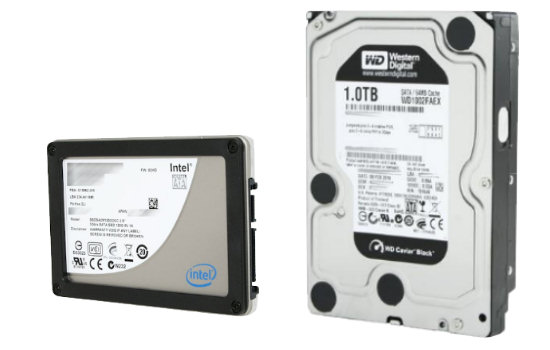Your hard drive is the storage mechanism for all your software and info. Today, hard drive space is incredibly cheap, but it’s also slow compared to the other components in the system. That’s why more and more folks are utilizing SSD, or solid state drives, as the main drive in the system to allow for faster boot times and quicker application launches for common apps. While these drives are more expensive, they offer performance 5 to 10 times greater than a standard hard drive.
Standard hard drives have a few factors that determine its speed - its interface and RPM both come into factor. The interface tells its maximum theoretical throughput. For instance, SATA 3.0Gb/s says the connection is a Serial ATA based connection with a maximum throughput of 3 Gigabits a second. The RPM tells you how fast the disc platters spin inside the drive. A drive rated at 7200RPMs will have platters that rotate 7200 times a minute - this means faster access to your data.
Finally, drives have two sizes - 2.5" and 3.5". While the 2.5" drives are typically for laptops, you can use these in many desktops just fine - as its a common formfactor for SSD drives.

Our Choice (SSD): Intel X-25M 80GB SSD ($179) [Available at NewEgg]
Our Choice (HD): Western Digital Black 1 Terabyte SATA 6.0GB/s 7200RPM ($89) [Available at NewEgg]
Alternatives:
This one is a little more up in the air. You might not necessarily need an SSD, saving yourself some money. There’s also plenty of other SSDs out there...for a price. We recommend looking at Intel, OCZ, Corsair, and Crucial if you are in the market for other size SSD drives.
For your standard hard drive make sure you get at least a 7200RPM drive. 500GB might be enough space for some, but at $85 a 1TB drive is a steal. Western Digital or Seagate are the way to go for these drives.
